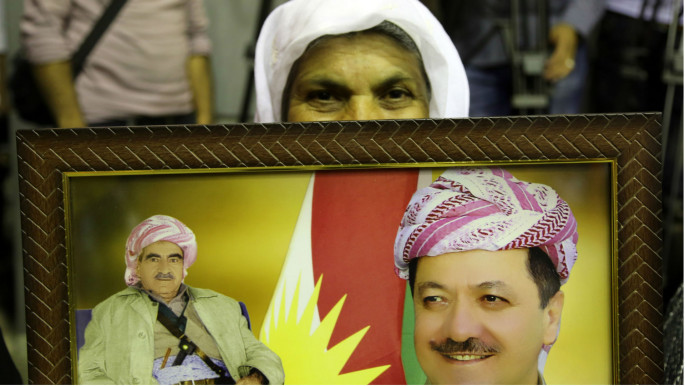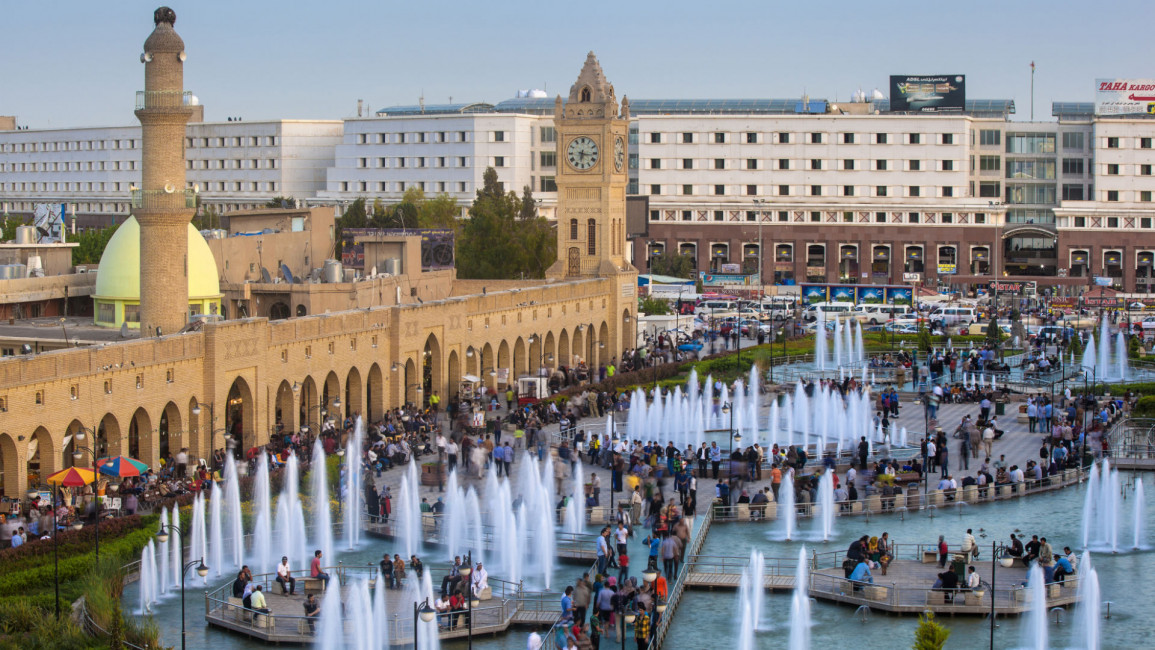
Iraqi Kurdistan being led blindly into the abyss
Iraq's car bombs of Iraq eluded Erbil for many years. It allowed the capital of Iraqi Kurdistan to enjoy a period of peace while Iraq burned. The city grew and prospered and it was soon at the heart of the Kurdish dream to establish an independent state.
When a suicide bomber blew himself up outside an Erbil government office on Wednesday, killing five people, Erbil joined the macabre list of Iraq’s cities of death, however.
The question now for the city and Iraq's Kurds is how to prevent a complete slide into the chaos of the rest of the
| Barzani has risked the reality of Erbil for the dream of Kurdistan |
country.
Surviving the chaos
It has been astonishing to see the president of the Kurdistan region, Masoud Barzani, successfully steer the region away from the bitter civil war that has ravished large parts of Iraq.
Instead, he channeled his energies to making Erbil a modern city. Within a decade a provincial town was transformed into a bustling metropolis, mirroring the super cities of East Asia. Erbil became a symbol of pride for Kurds, and made many believe that they were ready to finally declare independence.
Barzani’s success in keeping his areas out of the war is largely to do with the Kurds occupying a middle ground in a country shredded by sectarian differences. The Kurds seized on a historical opportunity to formulate a security plan that not only saved them from the abyss, but also strengthened their political position.
Despite rare glitches when Sunni extremists broke the iron shield around Kurdistan, the security plan worked. It also spared the Kurdish region official Shia forces in Baghdad and allied militias.
Peace allowed the Kurds to build bridges with its old adversary Turkey. After relations improved between Erbil and Ankara, the Turkish army laid off its pursuit of the Kurdistan’s Workers Party (PKK) in Northern Iraq. Soldiers were replaced by engineers, as Turkish companies signed contracts to rebuild the Kurdish cities of Erbil, Sulaymaniyah and Dohuk.
However, Wednesday’s suicide bombing may spell the end of the good times. Kurdish officials were quick to pin the blame on the Islamic State group, but this can from some viewpoints appear perplexing.
Syrian Kurds are fighting a bitter conflict with the IS group in Kobane and Barzani has sent hundreds of Peshmerga fighters to fight alongside the anti-IS group coalition. The reason cited was a friendship policy of the Peshmerga towards their "next of kin", in this case their Kurdish brothers across the border in Syria.
The Kobane conundrum
 |
|
| Will Barzani's decision to involve the Peshmerga in Kobane drag Erbil into the chaos of the rest of Iraq? (Anadolu) |
What we don't know is whether that decision breached any agreement reached secretly or tacitly between Iraq's Kurds and the IS group in Iraq. This might explain the car bomb in Erbil as a response from IS militants to Barzani 'breaking his word'.
Neither do we know if "Kak Masud", as he is known to Kurds, was under pressure to act because of nationalistic hysteria among his citizens. Such sentiments might also have conviced Barzani that the battle of Kobane constitutes a turning point for his movement and a chance to finally establish a powerful independent Kurdish state.
It is clear that the man has risked the reality of Erbil for the dream of Kurdistan. His actions in Kobane has probably forced him into a trap that the international coalition had originally planned for Turkish president Recep Tayyip Erdogan.
Many have posited secret motives behind the West’s interest in a border city that lacks any strategic importance. But as the battle for Kobane lingers on, Erdogan remains fixed in his boots and has refused to take part in the military operation. He has probably realised that the engineers of the crisis intend to pull Turkey into the same bloody swamp as Iraq and Syria. This would be in punishment for its critical position towards Israel and to shatter its image as an inspirational model for people in the Middle East.
Blind to reality
Erdogan told the Kurds “go ahead” in the fight with the Islamic State group. He opened Turkey’s doors to allow Peshmerga fighters to cross through the country into Syria from Iraq. The fighters fell as Erbil did, and the bloody conflict has dragged on.
Barzani’s father, Mullah Mustafa Barzani, was also a leader of the Kurdish Democratic Party. Speaking about his relationship with Israel, he said, “I am like the blind beggar who stands in front of the door of the Sulaymaniyah mosque. I don’t care about who places the money into my hand.”
His son's story is slightly different. A blind man also doesn't know if someone has led him into a minefield, or if they placed explosives into his hand instead of money.
This is an edited translation from our Arabic edition.
Opinions expressed in this article remain those of the author and do not necessarily reflect the opinions of al-Araby al-Jadeed, its editorial board or staff.



